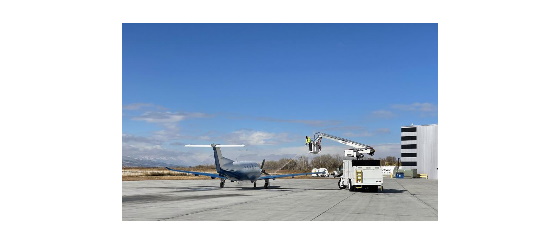Duncan Aviation’s Provo FBO now Louie Alliance Member and offers de-icing services

Duncan Aviation Provo de-icing
Lincoln, NEB – 18 November 2020 – During the months since the Duncan Aviation’s full-service Fixed Base Operator (FBO) rolled open its hangar doors in Provo, Utah, it has experienced incremental growth. The facility is now a member of the Fly Louie Alliance for Part 135 operators, which means Duncan Aviation’s name is on a national registry that informs transcontinental flyers that Duncan Aviation is an option for quality fuel in Provo.
“Every month since June, we’ve steadily increased fuel sales,” says Provo’s Manager of FBO Services Bob Cornett. “Since opening our brand new lobby and FBO in March, we have increased our visibility, and with business aviation being as small as it is, word has spread about our high level of customer service. Combine our level of service with a world-class Maintenance Repair Overhaul (MRO) and the advantages we provide customers are clear. That’s why we believe we’re growing.”
Cornett knows there are many other places in the area where customers can go for FBO services, so he believes that what differentiates Duncan Aviation is the level of enthusiasm, professionalism, and courtesy every member of the Provo FBO Services team brings every single day.
Additionally, in mid-October, the Duncan Aviation full-service FBO in Provo added de-icing capabilities to its services, and team members have been through a comprehensive training program on aircraft de-icing for Part 91 and 135 aircraft operators.
“Our de-ice truck has a 45-foot boom that gives us the ability to de-ice large-cabin aircraft. It has Type I and Type IV fluid, as well as a pressurized air system that can blow off soft snow,” says Cornett. “We apply the de-icing fluid to aircraft just prior to takeoff, and it blasts the ice and snow right off. You can see the steam rising from the plane in the frigid air.”
The Type IV de-icing fluid can be applied after Type I, and it prevents ice from forming. All four of Duncan Aviation’s full-service FBOs have de-ice trucks, and they all use the same two types of de-icing chemicals.
“Our team members go through rigorous training to learn to properly apply the de-icing fluid, and we all follow the same, strict written policies and procedures, as well,” said Cornett. “This is a vital service to be able to provide through the winter for our customers, and they can be confident that we have this service to keep their aircraft in safe operating condition during winter weather.”








